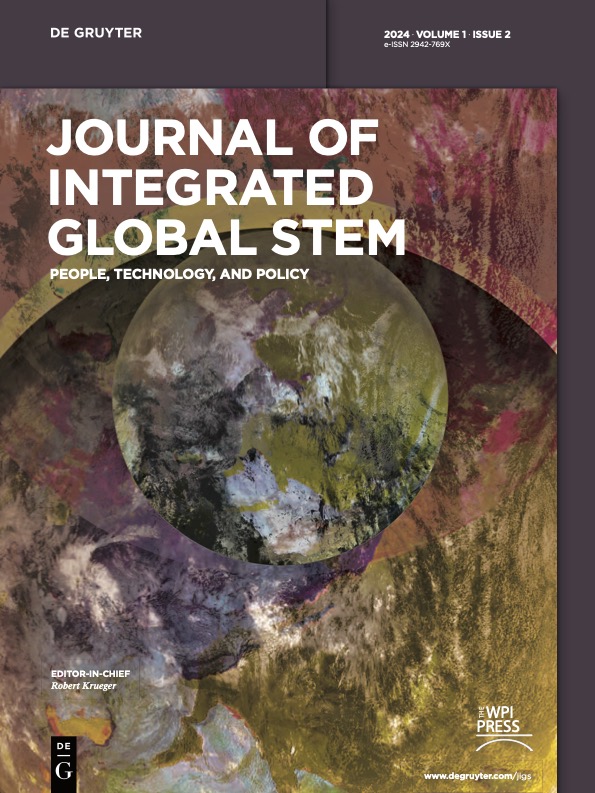Special Issue on Public Interest Technology
published by the Journal on Integrated Global STEM
November 8, 2024
Our age is one of rapid technological advancement and rampant inequality, where questions of ethics, fairness, transparency and accountability are increasingly urgent.
Public interest technology (PIT) has emerged as an important field of interdisciplinary inquiry to pose and answer these questions, leveraging the strengths of not only STEM fields but of public policy, law, social sciences, the humanities, and more. However, this growing field has not received significant attention in academic literature.
This special issue, edited by Amy Yeboah Quarkume and Robert Krueger, seeks to address the gap by starting a conversation to engage this new generation of socio-technical concerns, from how technology can serve people with disabilities, to questions of privacy in relation to generative AI tools, and the ethical, equitable design of educational technologies. The publication is a collaboration between WPI Press and De Gruyter.
Exploring the growing and significant field of PIT in the age of technocracy, where new frameworks, technologies, research projects, policies, and pathways for career exploration are revealing themselves.
Our contributors come from a rich tapestry of disciplines, including data science, Africana studies, communication and media studies, cyberinfrastructure, and disability studies. They represent a wide array of institutions and backgrounds—from Historically Black Colleges and Universities (HBCUs) and Minority Serving Institutions (MSIs) to undergraduate and graduate students, faculty members, industry professionals, and medical students.

Table of Contents
As an emergent interdisciplinary field that is driven by a combination of technological innovation, ethics, and social justice, there is no dedicated outlet for scholars working in this area to share their research. This has long been a concern for early career faculty who are attracted to both technology and its social implications as well as the progenitors of PIT who have sought to establish recognition for the interdisciplinary research involved in PIT. Amy Yeboah Quarkume, Guest Editor, Howard University
This discussion between Guest Editor Amy Yeboah Quarkume and PIT luminary Latanya Sweeney showcases how public interest technology has the power to drive more democratic and equitable solutions, refocusing innovation to tackle deep-rooted inequalities and champion a more just and inclusive technological future.Amy Yeboah Quarkume, Guest Editor, Howard University and Latanya Sweeney, Harvard University
The public interest suggests a singular approach to a social good, but lessons from history illustrate the nuances of sharing open space, transportation networks, and policy mandates. By acknowledging conflicts of interest and embracing the marginal, public interest technology could build ethical infrastructures to serve all. Anne L. Washington, New York University, and Joanne Cheung, University of California Berkeley.
As diffusion models emerge as a new frontier in generative AI, requiring vast image databases as their inputs, the question arises: how should regulators approach policies concerning the collection and utilization of these images? Though generative image models currently interpret the data they scrape as public, regulatory bodies have yet to confirm this as a viable understanding. This paper explores the current public/personal distinction of data as well as the respective legal standards for both categories in both the American and European context. Hannah Ismael, University of California Berkeley
Public Interest Technology is an emerging paradigm, scholarly domain, and potential contributor to reducing barriers, mitigating discrimination, and promoting human rights of people who have disabilities. Brian Gran, Case Western Reserve University and Anne M. Braden, Case Western Reserve University School of Medicine
Attention to Trust and Safety work – which performs a type of internal governance by attempting to mitigate disinformation, online harassment, extremism, and other harms – can complicate a monolithic view of what tech work is and who does it. Toby Shulruff, School for the Future of Innovation in Society, Arizona State University.
This study explores the intersection of public interest technology (PIT) and K-12 Black-oriented educational technology (EdTech) platforms in addressing educational inequities and racial biases. Symone E. Campbell, Howard University
Since the start of the last decade of the 20th century, the application of digital technologies with the potential of making substantial contributions to a community’s welfare have led to the creation of the literature of Public Interest Technologies and reinvigorated many areas of focus in the social sciences. A relevant subfield of this literature has been the application of new technologies to education to increase social public benefits. Pedro Huet, Indiana University
Artificial intelligence (AI) has become a buzzword around the globe. For many, AI was once contained in high-tech labs and has now been released out into the world for the rest of us to use. Generative AI, which is what Microsoft, Apple, and OpenAI have recently offered, is only one version of AI – probably the one with the most ‘curb appeal’ Zahra Zarei Ardestani, Esther Mao and Robert Krueger, Worcester Polytechnic Institute.
Meet the Editors

Amy Yeboah Quarkume, Guest Editor
Associate Professor of Africana Studies, Director of MA in Applied Data Science and CORE Futures Lab, Howard University
Affectionately known as Dr. A, she is a daughter of Africa, a scholar, filmmaker, data scientist, and professor. Her work as a data scientist centers around AI Bias, data inequality, and environmental justice, and she directs Howard’s Master’s Program in Applied Data Science and CORE Futures Lab. She serves as a PIT-UN Co-Designee for Howard University.

Robert Krueger, Editor-in-Chief
Professor and Department Head of Social Science and Policy Studies, Worcester Polytechnic Institute
Robert Krueger is a human geographer whose scholarship and teaching focus on creating sustainable, socially just, improvements to development projects in the global north and south. His scholarship and teaching challenge conventional notions of economic development, economy-environment relationships, and social change. He serves as the PIT-UN Designee for WPI.